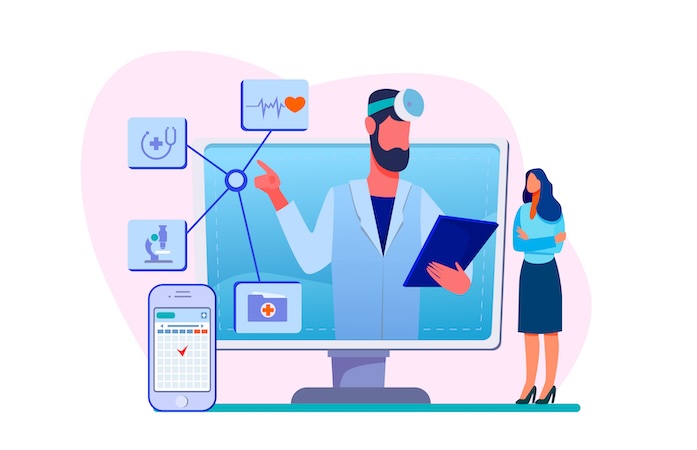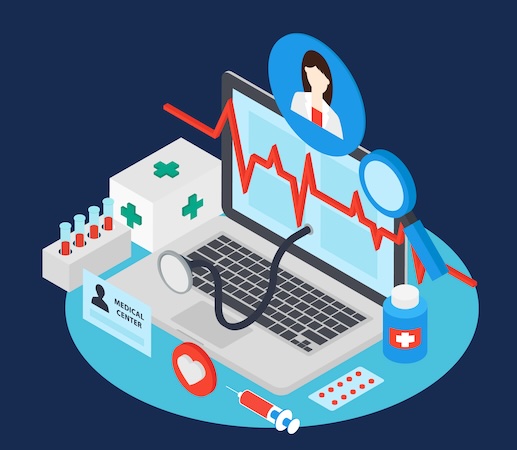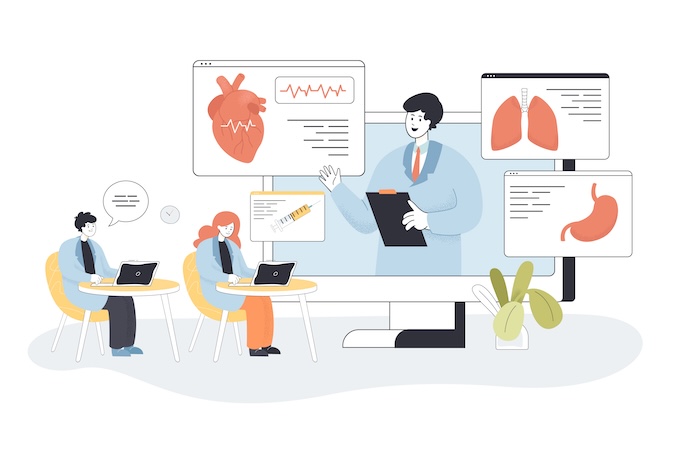In the rapidly evolving landscape of healthcare technology, knowing how to choose an EHR system is more crucial than ever. For key decision-makers at small to medium-sized clinics, hospitals, and practices, selecting the right EHR platform is a pivotal decision with lasting impacts. The criteria for choosing an EHR system are myriad but central to this decision is ensuring the system aligns with the unique needs and workflows of your healthcare facility.
But how can you make sure you’re opting for the right solution? And what happens if your current system no longer fits—do you leap straight to procuring a new EHR? The challenges involved in selecting an EHR system are significant and varied. From integration hurdles to scalability concerns, the process requires thorough analysis and careful consideration. Whether you’re navigating the transition to a new EHR or enhancing your current system with new functionalities, the goal remains the same: to ensure seamless, efficient, and secure management of patient health records.
In this guide, we’ll demystify the process, providing you with actionable insights and clear criteria to inform your decision-making. Our focus is not just on how to choose an EHR system but on ensuring it’s the right fit for your organization’s specific needs.
Top Takeaways:
- Understanding Your Unique Needs is Key: Navigating the complex process of EHR system selection starts with a deep understanding of your specific requirements. Whether it’s adjusting to new workflows, enhancing an existing system with marketplace apps, or custom development, the decision to switch or upgrade shouldn’t be taken lightly. Remember, the best choice is one that aligns perfectly with your facility’s current operations and future goals.
- Integration and Usability Are Game-Changers: When it comes to selecting an EHR platform, the focus should go beyond just features. How well does the system integrate with your existing tools? Is the user interface intuitive enough to ensure high adoption rates among your staff? These considerations are paramount because they directly impact your team’s efficiency and the quality of patient care.
- Cost vs. Value – A Balancing Act: While budgeting for an EHR system, it’s crucial to look beyond the initial costs and evaluate the return on investment. Consider how a potential system can enhance operational efficiency, comply with regulatory standards, and secure patient data. Opting for a system that offers the best value rather than the lowest cost will serve your practice well in the long run.
Table of Contents:
- Understanding Your Needs: Navigating EHR Selection for Optimal Care
- Unlocking EHR Success: Key Features to Seek
- Choosing the Right EHR Vendor
- Smooth EHR Transition: Implementation Considerations
- Cost and ROI Analysis Implications When Selecting an EHR
- Safeguarding Your Data: Compliance & Security Mastery
- Ready to Make the Choice?
Understanding Your Needs: Navigating EHR Selection for Optimal Care
Understanding the nuances of how to select an electronic health record system is paramount for healthcare executives. This decision is not merely about choosing software; it’s about selecting a foundation for optimal patient care and operational efficiency. Often, healthcare facilities find themselves at a crossroads due to various reasons.
If you’re considering a new electronic health record (EHR) platform, you’re likely in one of these situations:
- Need to switch from a legacy/unfit system: Current EHR doesn’t meet the evolving healthcare demands or lacks modern features.
- Need to merge data from separate systems into one: Streamlining operations post-merger or enhancing interoperability.
- Need to implement an EHR where none was used before: A unique opportunity to shape your digital infrastructure with minimal constraints.
- Seeking advanced analytics and patient engagement tools: Modern EHR platforms offer sophisticated tools for data analysis and improving patient interactions.
- Looking for improved regulatory compliance and security features: Newer systems may offer better mechanisms for staying compliant with healthcare laws and protecting patient data.
Perhaps the current EHR system lacks essential features or can’t accommodate updated workflows, or maybe a merger or acquisition has brought together entities with different EHR systems. In such scenarios, the immediate reaction might be to look for a new EHR system, but is that always necessary?
Do We Really Need a New EHR Platform?
Before jumping into the EHR selection process, it’s crucial to evaluate all possible options. Sometimes, enhancing the current system through apps available in the EHR marketplace offered by other vendors or developing custom modules/interfaces can provide a solution without the need to overhaul your entire EHR system.
These alternatives not only preserve the investments already made but also minimize disruption in patient care and staff retraining.
When considering how to select an electronic medical record system, understanding your facility’s unique needs becomes the bedrock of your decision. It starts with dissecting the workflows within your organization.
- How does information flow from one department to another?
- What are the pain points in the current system regarding patient data access?
- How versatile does the system need to be to handle various types of healthcare delivery models?
This introspective look should not stop at current needs but also anticipate future growth and changes in healthcare regulations. The right EHR system should be scalable and adaptable, capable of growing with your practice without significant additional investments.
Identifying Key Players in the EHR Decision-Making Arena
The first step in selecting an EHR system is to identify all stakeholders: it’s not a solo expedition but more of a team effort. Each member brings a unique perspective, ensuring the chosen system aligns perfectly with the multifaceted needs of your healthcare facility. Who are these champions, you ask?
- CIOs and CTOs: The tech visionaries. They’re looking at the big picture, considering how an EHR can future-proof the organization. Can it adapt to emerging tech trends?
- IT Managers: The backbone of implementation. They’re concerned with the technical nuts and bolts—integration with existing systems, data migration, and overall system stability. How seamless is the integration?
- Clinical Directors and EHR Project Managers: The user experience advocates. They focus on functionality and how the system supports clinical workflows. Will it make life easier for the medical team members?
- Healthcare IT Specialists and Clinical Informatics Specialists: The data gurus. They analyze data flow, interoperability, and how well the system supports meaningful use. Does it facilitate better patient outcomes through data insights?
- Practice Managers: The operational wizards. Cost, efficiency, and impact on daily operations are their main concerns. How does it affect the bottom line?
- Financial Officers: The budget guardians. They scrutinize the cost against the ROI, looking at long-term financial sustainability. Is the investment justified?
Each of these stakeholders plays a critical role in the decision-making process, bringing their expertise to the table to ensure that the chosen EHR system isn’t just a technological upgrade but a tool that enhances patient care, streamlines operations, and supports the strategic goals of the organization.
Engaging them early and often in the selection process is key to finding the perfect fit for your facility’s needs. Through constructive dialogue and collaboration, you’ll be able to sift through the options and select an EHR platform that ticks all the boxes, ensuring everyone from the boardroom to the exam room benefits from the new system.
Curious about how to bring your vision to life in the healthcare sector? Check out our comprehensive guide on how to build a healthcare app, where we break down the process into manageable steps, peppered with expert insights and actionable strategies.
Unlocking EHR Success: Key Features to Seek
In the quest of how to select an EHR system, understanding the key features and functionalities that an EHR system must possess is critical. This understanding ensures that the chosen system aligns with the unique needs of your facility, thereby promising the best solution for managing health information technology and medical records efficiently.
Essential Features and Functionalities
Usability and User Experience: At the core of any EHR system, usability stands paramount. A system that is intuitive and easy to use reduces training time, enhances user adoption rates, and minimizes errors. The ideal EHR platform should have a user-friendly interface that simplifies daily tasks for healthcare providers, making information retrieval and entry as seamless as possible.
Interoperability: In today’s healthcare ecosystem, the ability of different information systems, devices, and applications to access, exchange, integrate, and cooperatively use data in a coordinated manner within and across organizational boundaries is vital. An EHR system that offers robust interoperability ensures that patient information flows seamlessly between departments, facilities, and external entities like laboratories and pharmacies.
Related: Guide to EHR Interoperability
Customization and Scalability: Healthcare facilities vary greatly in their operations and needs. The EHR system you choose should be highly customizable to adapt to your specific workflow requirements. Additionally, it should be scalable and capable of growing with your facility as it expands or evolves.
Data Security and Compliance: With the increasing threats to digital data, security features cannot be overlooked. The system must comply with healthcare regulations such as HIPAA in the US, ensuring patient data is protected securely. Encryption, access controls, and regular security updates are essential features to look for.
Types of EHR Systems and Their Benefits
EHR systems come in various types, from fully integrated systems designed for large hospitals to specialty-specific EHRs tailored for particular medical practices. Understanding these differences is crucial in selecting the best system for your facility:
- Integrated EHR Systems offer a comprehensive suite of services, including billing, appointment scheduling, and clinical documentation in one package. They are best suited for facilities looking to streamline all their processes through one platform.
- Cloud-Based EHR Systems provide access to medical records and health information technology through the internet. They are favored for their lower upfront costs, ease of access, and flexibility.
- Specialty EHR Systems are designed with the specific needs of certain medical specialties in mind, incorporating features and workflows unique to those practices.
Each type presents its benefits, from improved patient care and safety to increased operational efficiency and reduced paperwork. The right system not only aids in the effective management of medical records but also supports the delivery of high-quality healthcare.
To ensure that your facility makes an informed decision, it’s crucial to weigh these features and benefits carefully against your specific needs and goals. Selecting the right EHR system is a significant step towards modernizing your healthcare delivery, improving patient outcomes, and achieving operational efficiencies.
For more insights on navigating this essential process, particularly when considering the financial aspects, we recommend exploring our other blog on the cost of EHR implementation. This resource provides valuable information to help you understand and plan for the investment required in adopting an EHR system, ensuring that your decision is both strategic and financially sound.
Choosing the Right EHR Vendor
When it comes to selecting an EMR, the decision-making process is crucial for ensuring a successful EHR implementation. The choice of a vendor can significantly affect not just the initial implementation process but also the long-term success and scalability of your healthcare facility’s digital infrastructure.
Criteria for Vendor Evaluation
Here are some essential criteria to think through during this process, designed to guide you toward making an informed decision that aligns with your facility’s plans and priorities.
Integration Capabilities
One of the most important aspects to consider is how well the EMR system integrates with your existing systems and third-party applications. Seamless integration ensures that there is an uninterrupted flow of data across platforms, which is essential for maintaining operational efficiency and ensuring comprehensive care.
Related: A Guide to Integrating your health app to an EHR
Vendor Reputation and Experience
Investigate the vendor’s track record in the industry. A vendor with a solid reputation and extensive experience in successful EMR implementation projects is likely to offer a product and service that can meet your complex needs.
Support and Training
Look for vendors who provide robust support and training programs. The implementation process can be complex, and having access to expert guidance is critical to a smooth transition. Adequate training ensures your staff can utilize the new system to its full potential, enhancing user adoption rates.
Customization and Scalability
The chosen EMR should allow for customization to fit your facility’s unique workflows. Additionally, it must be scalable to accommodate future growth without significant additional investments or disruptions.
Cost-Effectiveness
While cost should not be the sole factor in your decision-making process, it’s important to consider whether the EMR offers value for money. Assess not only the initial costs but also ongoing expenses such as updates and support.
Security and Compliance
Ensure the vendor upholds the highest standards of data security and complies with relevant healthcare regulations. This will protect your facility from legal and reputational risks associated with data breaches.
Advanced Vendor-Specific EHR Functionality to Consider
To truly leverage the potential of an EHR system, healthcare facilities should consider advanced functionalities that can future-proof their operations and enhance patient care. And if a vendor doesn’t provide one of these functions out of the box, consider working with an expert healthcare app developer to custom build or integrate the missing piece.
Key areas to explore:
- AI/ML Integration: Artificial Intelligence (AI) and Machine Learning (ML) capabilities can significantly improve diagnostic accuracy, predict patient outcomes, and personalize patient care plans.
- IoMT Integrations: The Internet of Medical Things (IoMT) allows for seamless connectivity between medical devices and the EHR system, enabling real-time monitoring and data analysis for better patient management.
- Blockchain Compatibility: Blockchain technology offers a secure and immutable record-keeping system, enhancing patient privacy and data integrity across the healthcare ecosystem.
- Telehealth Features: With the rise of virtual care, EHR systems equipped with telehealth functionalities can offer convenience and accessibility to patients, extending the reach of healthcare services.
- Big Data Analytics: Harnessing the power of big data analytics within EHR systems can provide insights into population health trends, optimize operational efficiencies, and improve healthcare delivery.
By carefully evaluating these criteria, healthcare organizations can make a strategic choice in selecting an EMR that supports their goals for a successful EHR implementation. Not only does this facilitate the initial integration, but it also lays the groundwork for enhanced patient care and operational efficiency.
For more insights on ensuring seamless system integration and maximizing the benefits of your new EHR, explore our detailed article on EHR integration. This guide provides valuable strategies and considerations to help you achieve a smooth and efficient integration process, enhancing your healthcare services’ overall quality and reliability.
Smooth EHR Transition: Implementation Considerations
In the intricate process of choosing a health information system, understanding the multifaceted landscape is key to ensuring your practice management system aligns seamlessly with your clinical and administrative needs.
This phase is critical, as the selected system will become the backbone of your operations, influencing both the quality of patient care and the efficiency of your services. Here’s what you need to consider during this pivotal decision-making stage.
Implementation Process & User Adoption
Tailored Fit: The ideal health information system should not only accommodate but enhance your existing workflows. It implies the system should integrate smoothly with your current processes, minimizing disruption while maximizing efficiency. Whether it involves EHR data migration or adapting to a new way of practice management, the system should be flexible enough to meet these needs.
Training & Support: One of the most significant factors for a smooth transition is the availability and quality of vendor-provided training and support services. A comprehensive training program is crucial for swift user adoption and meaningful use of the new system. Ongoing support ensures that any technical issues can be resolved promptly, reducing downtime and maintaining continuity of care.
Scalability: Your chosen system should not only meet your current needs but also have the capacity to grow with your practice. Scalability is essential as it allows for expansion in terms of products, services, and user numbers without needing a complete system overhaul.
Interoperability: A health information system with high interoperability facilitates seamless communication between various healthcare systems and devices. This capability is crucial for integrating EHR data across platforms, enhancing patient care through a comprehensive view of patient records.
Security & Compliance: Ensuring that the selected system adheres to strict security protocols and compliance standards, such as HIPAA, cannot be overstated. Protecting patient data from breaches and ensuring privacy is paramount for trust and legal reasons.
Also Read: HIPAA Compliant App Development Guide
By meticulously considering these aspects when choosing a medical information system, healthcare providers can significantly influence the success of their EHR implementation and the long-term efficiency of their operations. It’s an investment in the future of healthcare delivery, making the selection process a foundational step towards achieving clinical excellence and operational competence.
Cost and ROI Analysis Implications When Selecting an EHR
In the intricate world of healthcare technology, choosing an EMR system is a pivotal decision that requires careful consideration, especially for small businesses. It’s about finding a balance between immediate needs and long-term sustainability. But how do you ensure that your choice today remains a valuable asset tomorrow?
Team-Based Approach to Cost Analysis
First off, involve your team in the cost analysis process. Whether it’s IT specialists or financial officers, a team-based approach ensures all aspects of the investment are considered. But what should you focus on?
- Initial Setup Costs: Beyond the price tag, consider the costs associated with data migration, staff training, and any customization required.
- Operational Efficiency: How will the new system streamline workflows? Improved efficiency often translates to cost savings in the long run.
- Scalability: Can the system grow with your practice without exponential cost increases?
Long-Term Considerations
The total cost of ownership extends far beyond the initial investment. When choosing an EMR system, think about the following:
- Maintenance and Support Fees: These ongoing expenses can significantly impact your budget.
- EHR Upgrades and Updates: Ensuring your system stays up-to-date might require additional costs but is crucial for compliance and security.
- Integration Capabilities: Compatibility with other systems could save costs related to interoperability issues.
Assessing ROI
Ultimately, the value of an EMR system to a small business lies in its return on investment. Key indicators include enhanced patient satisfaction, reduced administrative burdens, and improved clinical outcomes. When these factors lead to higher patient retention rates and more efficient practice management, the ROI becomes clear.
For those considering taking a step further, building a customized solution tailored exactly to your needs might be the way forward. For detailed insights on how to develop EHR or EMR system tailored specifically to your unique requirements, explore our comprehensive guide.
Safeguarding Your Data: Compliance & Security Mastery
When choosing an EHR system, navigating the complex terrain of compliance and security is as critical as any feature or functionality. As you’re well aware, the stakes in healthcare are uniquely high—where professional liability, risk management, and adherence to meaningful use standards directly impact patient care and privacy.
- Compliance: Every EHR system must meet rigorous healthcare regulations, including HIPAA in the U.S., to protect patient data privacy. Does your chosen system comply with these requirements? A thorough requirements list should be your compass here.
- Data Security: Beyond compliance, how does the system protect against breaches? Consider encryption, access controls, and audit trails as your shields against risk.
- Meaningful Use: It’s not just a buzzword; it’s a benchmark for effective digital health record use that benefits patients and providers alike. How well does the system support these objectives?
In navigating these waters, remember, that your choice of EHR system plays a pivotal role in both professional liability management and fulfilling the promise of technology-enhanced healthcare.
For a deeper dive into optimizing your EHR strategy, particularly focusing on Allscripts EHR integration, don’t miss our detailed analysis with valuable insights into making a seamless transition, ensuring your organization meets its compliance, security, and operational goals.
Ready to Make the Choice?
Choosing the right EHR system is more than a technological upgrade—it’s a strategic decision that positions your healthcare facility for future success.
Every step in how to choose an EHR is crucial, from understanding your current and future needs, navigating through the myriad of available options to making an informed choice that will enhance the efficiency and quality of patient care.
Remember, avoiding common pitfalls such as prioritizing cost over functionality or overlooking user adoption can make the difference between a system that elevates your practice and one that becomes a hindrance.
At Topflight, we don’t just talk about EHR integration; we lead by example. Our expertise and successful case studies reflect our commitment to excellence and our ability to turn challenges into opportunities.
Created an AI-driven medical coding platform that integrates seamlessly with EHRs and medical APIs. Best use case for EHR in medical billing. Achievements:
- Identified CPT codes in seconds, boosting revenue by up to 15%.
- Reduced the time spent on coding by 97%.
- Integrated successfully with major EHR systems for improved provider experience.
Developed a remote patient monitoring platform facilitating Medicare compliance and back-office automation via an EHR. Achievements:
- Monitored over 1,100 patients daily.
- Secured a $300,000 ARR through a SaaS subscription model.
- More than 80% of patients reached CPT code targets.
Built a comprehensive health monitoring ecosystem integrating patient and physician digital experiences. Achievements:
- Deployed a solid MVP using a no-code/low-code infrastructure for quick adaptation.
- Ensured strong security measures in line with HIPAA guidelines.
- Worked with a ready-made EHR framework.
If you’re on the path of how to select an EHR and need a partner that brings clarity, depth, and actionable insights, reach out to us. We’re here to guide you through every step of the process, ensuring your EHR system is not just a choice but a lasting solution to your healthcare needs. Contact us today for a consultation and discover how we can help optimize your healthcare operations with the perfect EHR solution.
Selecting the best EHR involves understanding your facility’s unique needs and workflows. Have you explored the diverse functionalities available? Do they align with your operational goals? Remember, the best EHR should improve efficiency, enhance patient care, and ensure data security. The selection process involves several crucial steps: 1) Assess your current needs and future goals. 2) Research and compare different EHR systems. 3) Consider integration capabilities with existing tools. 4) Evaluate vendor support and training options. 5) Pilot the system before full implementation. An EHR system comprises: 1) Patient Management: Tracks patient information and visits. 2) Clinical Operations: Documents treatment, prescriptions, and outcomes. 3)Reporting and Analytics: Offers insights into clinical data for improved decision-making. Avoid overlooking user training and engagement, which are key to successful adoption. Ignoring data migration and integration needs can also result in operational hiccups. Finally, don’t underestimate the importance of ongoing vendor support. EHR systems streamline the healthcare experience by ensuring that patient records are accurate, accessible, and secure. By facilitating smoother operations, healthcare providers can focus more on patient care than paperwork, potentially boosting patient satisfaction through quicker, more personalized service.Frequently Asked Questions
How to select the best EHR?
What steps are included in the selection of an EHR?
What are the three components of the EHR systems?
What should you avoid when using EHR?
How can EHR systems impact patient satisfaction?





